For those deeply entrenched in pop culture, the buzz is unavoidable: the shared DC universe, masterminded by James Gunn and producer Peter Safran, is amid some exciting evolution. This isn't your run-of-the-mill Hollywood shake-up. Oh no, this is about reinvigorating an entire fictional cosmos with fresh faces in front of and behind the camera, compelling characters, and jaw-dropping storylines. Much like how the
Marvel Cinematic Universe (MCU) took inspiration from iconic comic arcs like "Civil War" and "Infinity War," the DC Universe (DCU) is set to do the same. It's not just about copying what works; rather, it's about creating a harmonious blend of visual storytelling that honors its ink-and-paper origins. That got us thinking: What are the crème de la crème of DC comic arcs that could and should be adapted into this emerging, restructured DCU? So, without further ado, let's dive into a handpicked list of the top 7 DC Comics storylines that are just begging to be brought to life on the silver screen of the new DCU. Stay tuned because this is where comics and cinema converge to create something epic.
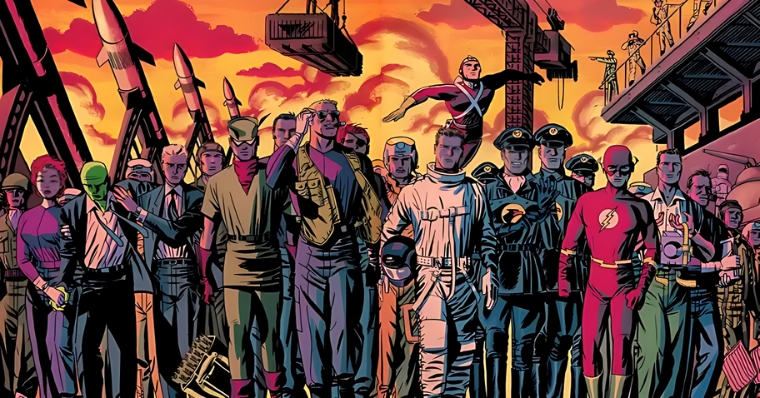
DC: The New Frontier
Step into the narrative vortex that is "DC: The New Frontier," a game-changing storyline that serves as an origin tale for none other than the Justice League. Written and illustrated by the legendary Darwyn Cooke, who graced us with this gem back in 2004, this limited series delves deep into the psyches and motivations of iconic heroes from the Golden and Silver Ages of comics. If ever there was a layered narrative that wove ethical quandaries, social debates, and political undertones into the tapestry of superhero lore, this is it. So, let's break it down: we've got heavy hitters like Superman, Batman, and Wonder Woman rubbing elbows with Silver Age stars like the Flash, Green Lantern, and Martian Manhunter. Together, they go head-to-head with an enigmatic entity that has been dormant on Earth. Imagine Earth's mightiest champions locked in a struggle against a cosmic-level threat, only this time. They're not just fighting the bad guy—they're grappling with governmental oversight and moral ambiguity. Yes, you read that correctly. This isn't just a battle of punches and laser beams; it's a theatre of ideological and ethical complexities. What makes "The New Frontier" even more fascinating is that it offers a spotlight to characters who usually linger in the B-list of the DC hero roster. With James Gunn's knack for injecting depth into lesser-known characters (I mean, who cared about the Guardians of the Galaxy before his films?), this storyline is practically custom-tailored for his filmmaking style. Just to level with you, "The New Frontier" isn't some forgotten relic of comic book history, far from it. It was initially released as a six-issue limited series and later bundled into two trade paperback volumes. Oh, and let's not forget its animated film adaptation, "Justice League: The New Frontier," or the deluxe edition that came out in 2015, replete with all the original issues, sketches, and notes by Cooke. In terms of influence, think of it as a spiritual cousin to works like "Kingdom Come," "The Golden Age," "Watchmen," and "Batman: The Dark Knight Returns." It might be situated primarily in the 1950s, but its themes are timeless. This narrative bridges the historical gap, taking us from the tail end of the Golden Age right into the fledgling years of the Silver Age in the DC Universe. In nerdy multiverse terms, we're talking about a story that originated in Earth-260 pre-Crisis and migrated to Earth-21 post-Crisis. So, in the grand scheme of things, "DC: The New Frontier" has all the makings of a cinematic spectacle waiting to unfold, teeming with the ethical complexities and vibrant characters that could seamlessly meld into the tapestry of James Gunn's revamped DC Universe. And hey, it doesn't just deserve a seat at that table; it might just be the main course.
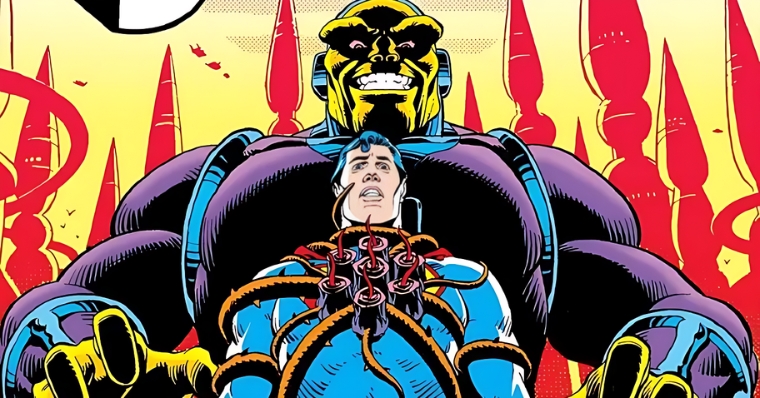
For the Man Who Has Everything
Here's a comic arc that's got it all—emotions, thrills, and mind-bending psychological drama: "For the Man Who Has Everything." Crafted by none other than Alan Moore and brought to life through the vivid artistry of Dave Gibbons, this storyline originally graced the pages of Superman Annual #11 back in 1985. In it, we kick things off with a birthday bash—or rather, the intention of one. Batman, Robin, and Wonder Woman decide to drop by Superman's Fortress of Solitude to celebrate the big day. But what they find is far from a party. Superman is immobilized, trapped in a dream world by the Black Mercy, a parasitic plant that digs deep into your psyche and serves your deepest desires as reality. The Black Mercy is a "gift," if you can call it that, from the villain Mongul. So, while Batman and Wonder Woman duke it out with Mongul back in reality, we get a VIP pass straight into Superman's dream life. What unfolds is what the Man of Steel subconsciously yearns for a life on a still-intact Krypton, surrounded by family and devoid of the responsibilities and dangers of being Earth's guardian. Now, this story isn't just confined to the comic realm. It's been translated to the animated screen in a standout episode of "Justice League Unlimited." The animated take preserves much of the original emotional weight but shifts the atmosphere. Superman's life in the animated version is mostly idyllic. Instead of complex political drama, Superman's animated dream world is much more comforting, but with some clues that things aren't quite perfect—random earthquakes and Jor-El's voice shifting, to name a couple. No Jason Todd in this one; it's Batman and Wonder Woman to the rescue. So, why should James Gunn pay attention to this arc? This is Gunn's sweet spot: an emotionally charged, ethically complicated, visually stunning story. If you've watched "Guardians of the Galaxy," you know Gunn excels in threading serious emotional arcs through a genre that often prioritizes action over emotion. The blend of psychological complexity and dream-like sequences could be catnip for a director like him, allowing audiences to engage with the superhero genre in a heady and heart-pounding way. Trust me, this could be the story that adds a new, intricate layer to the superhero film landscape. If Gunn grabs hold of it, we're in for a real cinematic treat.
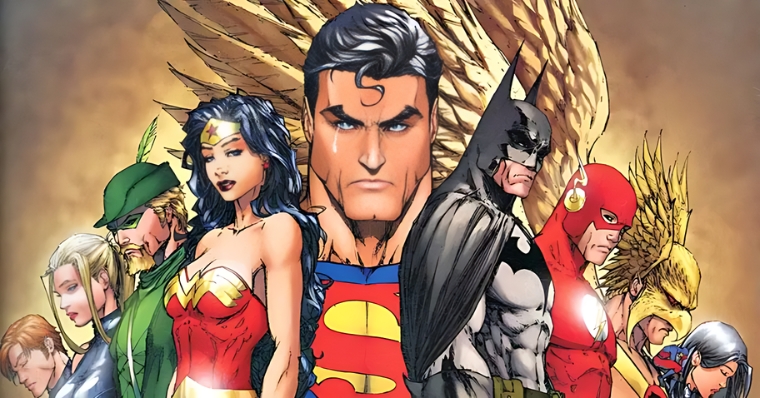
Identity Crisis
In the realm of superhero comic stories, "Identity Crisis" is a gripping tale that shifts the stakes from cosmic threats to the unnervingly personal. Written by Brad Meltzer and illustrated by Rags Morales, with inking by Michael Bair, the seven-issue limited series was published by DC Comics from June to December 2004. But hold on, this isn't your run-of-the-mill "save the universe" narrative—this is a murder mystery that ends up picking apart the very fabric of the Justice League's moral code. When a mysterious killer starts targeting people close to their alter egos, the Justice League—usually busy battling aliens or tinkering with time streams—find themselves in unfamiliar terrain. They're essentially transformed into detectives, scouring the nation for clues. A subgroup comprising Green Arrow, Black Canary, Hawkman, Atom, and Zatanna are left guarding an explosive secret, the revelation of which could redefine the age-old dynamics between heroes and villains. Now, let's talk about ambiance and impact. "Identity Crisis" got rave reviews for a reason. It ditched the bombast typical of superhero narratives for a more intimate, tense atmosphere. This shift drew polarized opinions but indisputably made the comic a game-changer in the DC Universe, with long-lasting repercussions that even set the stage for later significant events like "Infinite Crisis" and "Final Crisis." So, what makes this story so darn compelling and ripe for the picking by James Gunn for the next evolution of DC's cinematic universe? Well, for starters, the storyline delves deep into the psychology of both prominent and lesser-known heroes . From Batman to Green Arrow to Atom, everyone gets a moment in the spotlight, revealing a wide array of flawed, vulnerable, and deeply human characters. Gunn has a knack for this kind of complex characterization, and "Identity Crisis" offers an array of rich material to adapt into emotionally resonant cinema. Moreover, this comic presents morally gray scenarios that shake the very foundations of heroism, an ideal breeding ground for Gunn's storytelling sensibilities. It even draws from an eclectic range of DC's rich history, recontextualizing characters and their backstories in a thoughtful and controversial way. From big-league members to minor characters, everyone is meticulously layered and multifaceted. Imagine Gunn bringing in lesser-known heroes and shining his directorial spotlight on them. And let's not forget the tantalizing betrayals and secret-keeping within the Justice League that could make for captivating plot twists on the big screen. The repercussions of "Identity Crisis" were so profound that they echoed throughout various DC titles, from "Justice League" to "Batman" to "Teen Titans." This offers Gunn an enormous sandbox to play in, an interconnected narrative playground that suits his storytelling style where every detail is a set-up for a future payoff. And hey, it's not just the adult heroes who take center stage; younger characters like Tim Drake and the Teen Titans also find themselves grappling with the ramifications of the crisis. Gunn's nuanced approach to character development could potentially flesh out these younger characters, offering a multi-generational appeal to the film adaptation. In a nutshell, "Identity Crisis" led to the disbanding of the Justice League and redefined the group's tone in the following comics. It had both naysayers and ardent fans, but no one could deny its impact. Suppose Gunn got his hands on this story. In that case, we could be looking at a cinematic experience that's not just entertaining but also deeply challenging and thought-provoking, pushing the boundaries of what superhero films can be.
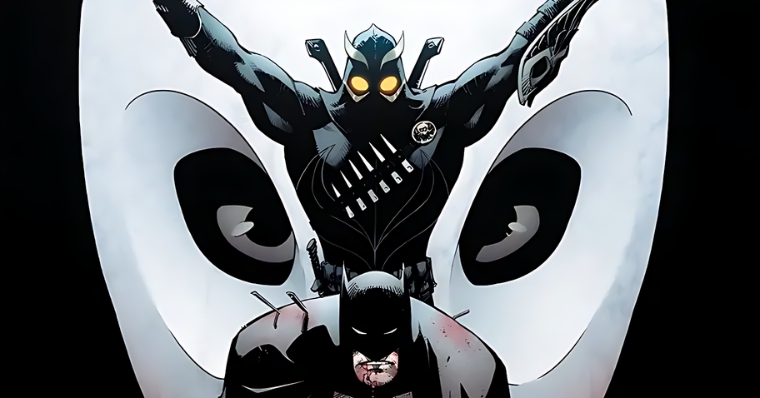
Batman: The Court of Owls
When Scott Snyder got his hands on Batman during the era known as the New 52, he wasn't just content to write another caped crusader tale. He decided to challenge everything we thought we knew about Gotham City and its ever-vigilant defender, Batman. Snyder brought in an element that pushed the Dark Knight to his absolute limits: a secret society known as the Court of Owls, who have been puppeteering the city's fate from the shadows, hidden even from Batman's all-seeing detective eyes. In confronting this enigmatic community, Batman isn't just squaring off against a villain of the week. He's forced into a battle that makes him reevaluate the very core of his beliefs. He starts questioning what he thought he knew about Gotham's history, diving into dark corners even he didn't know existed. And, oh boy, it even makes him rethink the circumstances surrounding the death of his parents. Talk about a gut punch to both Batman and the audience! The narrative's depth is so resonant that despite being relatively new to the Batman lore, it's already drawing comparisons to some of the best Batman stories ever inked. It's like watching a new athlete stepping onto the field and hitting a home run in their first at-bat. Wouldn't it be something if this narrative fueled the next chapter in James Gunn's DC Universe? Gunn, who has a reputation for turning complex, even morally gray characters into cinematic gold, could find the Court of Owls to be a creative goldmine. Their cloak-and-dagger mystery would offer a rich backdrop for Gunn to explore, adding layers of depth to the existing DC film tapestry. But why stop at the surface level? You see, Batman, when faced with the Court, isn't just experiencing external conflict; it's also a profound internal struggle. Batman is fractured, broken down both mentally and physically in a way we've seldom seen. The hero's vulnerability is spotlighted, humanizing a figure often seen as invincible. Imagine translating that raw emotional gravitas onto the big screen—audiences would be glued to their seats! Snyder's storytelling is superb, but let's not forget Greg Capullo's artwork, which acts like the perfect dance partner to Snyder's narrative . The style is contemporary, gripping, and the kind that demands to be experienced in a cinema with Dolby surround sound and an IMAX screen. The stakes in "The Court of Owls" are immensely high but carefully balanced. We're not talking about a cosmic-level threat here. It's not some outlandish "the galaxy is at risk" scenario. But it's terrifying because it's intimate, affecting a space Batman holds dear—Gotham City. This shadowy cabal has been playing 4D chess with the entire city, making the stakes feel immediate and genuinely threatening. It's this balance that would resonate well in a James Gunn-directed narrative. James Gunn has a particular genius for raising the stakes while keeping the story grounded in complex characters and thorny moral quandaries. A Gunn-led "Court of Owls" could be a narrative tour de force, setting the stage for a new era in the DC Universe. Think of it as a perfect storm: a beloved character, a groundbreaking comic arc, and a visionary director. Now that's a triple threat if I ever saw one!
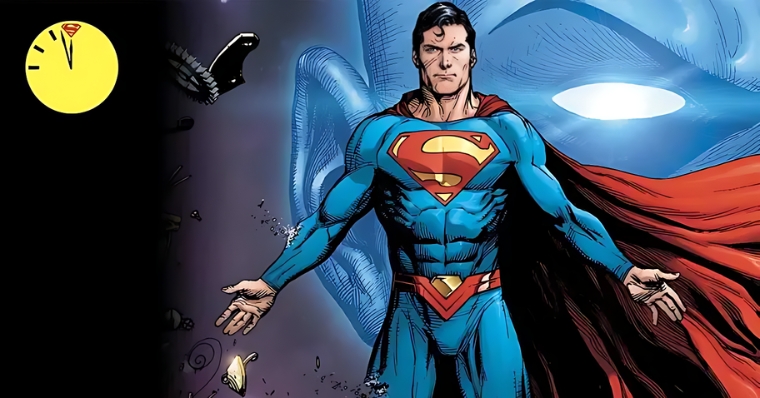
Doomsday Clock
The role of "Doomsday Clock" in setting the stage for the future of the James Gunn DC Universe (DCU) shouldn't be underestimated. It's like laying down a versatile chessboard for an epic game where the rules are ever-changing yet fundamentally rooted in decades of lore. We're not talking about a simple comic book storyline here; this is monumental stuff. Considering how "Doomsday Clock" might fuel the next wave of the James Gunn DCU, consider the narrative fabric it offers. Gunn is known for taking risks and pushing boundaries, right? Well, "Doomsday Clock" comes packed with a kind of audacious storytelling that Gunn could really sink his teeth into. The comic delves deep into meta-narratives, exploring the very existence of the DC Multiverse and even suggesting that Superman's arrival on Earth catalyzed everything. Talk about a treasure chest of thematic elements for Gunn to explore! Adding to that, the daring move to integrate "Watchmen" characters into the traditional DC Universe could be a game-changer for future story arcs . I mean, envision a movie or TV series where characters from "Watchmen" meet, fight, or maybe even team up with your DC favorites. It sounds like just the kind of crazy, intricate plotting that would perfectly align with James Gunn's storytelling sensibilities. The complex narrative woven around Superman and the "Supermen Theory" opens up avenues to explore governmental involvement in creating metahumans. This kind of socio-political underpinning could be a perfect match for Gunn's style, who's never shied away from infusing his stories with deeper themes and messages. Even more fascinating are the storylines that discuss the endless reboots and continuity shifts in the DC world. If there's one thing James Gunn is stellar at, it's embracing and transcending existing lore to create something that feels both fresh and respectful of the source material. "Doomsday Clock" offers not just a blueprint but an intricate roadmap for navigating these turbulent narrative waters while staying true to the core essence of the characters. The intriguing new characters introduced in "Doomsday Clock," like the new Rorschach and the criminal couple Mime and Marionette, could also be ideal candidates for Gunn to adapt to his universe. Considering his knack for spotlighting lesser-known characters and making audiences care about them, these fresh faces could become the following fan favorites under his direction. Finally, let's not forget the emotional depth and societal critique that "Doomsday Clock" brings to the table. These elements could give Gunn an expansive playground to grapple with modern-day issues and complexities, adding another layer to his storytelling arsenal. All said, if James Gunn were to lean into the storytelling opportunities presented by "Doomsday Clock," we could be on the cusp of a new era of the DCU — one that marries deep-rooted legacy with contemporary storytelling in a blend that's as exhilarating as it is respectful of its rich past.
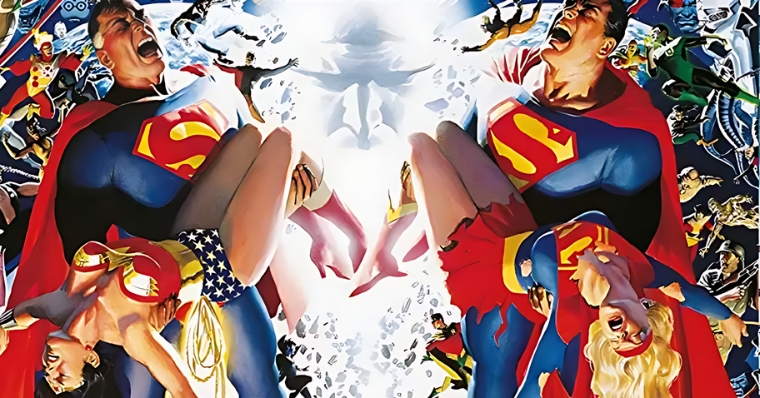
Crisis on Infinite Earths
"Crisis on Infinite Earths" isn't just another storyline; it's a monolithic monument in the landscape of DC Comics. Sure, it's complicated as all get out. A labyrinth of characters and plot twists, this comic arc might make you think it's too sprawling to adapt for any other medium. But hold on a minute: its complexity is precisely what makes it a goldmine for cinematic translation, especially under the creative guidance of someone like James Gunn. This comic not only redefined but organized the fragmented worlds of DC, essentially hitting the cosmic reset button on decades of lore. Let's talk stakes: The villain, Anti-Monitor, doesn't just go for your run-of-the-mill evil plans; he's out to destabilize entire parallel universes. Yeah, you heard that right. This comic is chock-full of not just one but multiple iterations of iconic characters like Superman, Batman, and Flash, all scattered across varying realities. It's like a superhero fan's dream, only meticulously plotted on paper. And what sets "Crisis on Infinite Earths" apart from any other event book ever made? Well, let's dig in, shall we? First, the writer-artist duo of Marv Wolfman and George Perez is unparalleled. They've got a rare sort of symbiotic relationship where they're both outstanding individually but reach a kind of narrative nirvana when they collaborate. They're the brains behind the "New Teen Titans," a series that still holds up decades later. With this track record, could you ask for a better team to pull off a high-stakes multiverse saga? Speaking of high stakes, let's talk about the villain—the Anti-Monitor. This baddie didn't just set a precedent; he's the archetype of the all-powerful, big bad event villain. Imagine a villain so menacing that he doesn't just fight the heroes; he threatens the very fabric of their realities. We're talking about a cosmic-level antagonist doing it before it was cool, way back in 1985. But it wasn't just a cosmic-level chess game with super-beings. The comic also focused on the rogues' gallery, reminding us that even in a multiverse at stake, villains will do what villains do best: exploit the chaos. The comic even had an issue titled "Villains War," which showcases terrible guys taking advantage of the unrest to strike at our beleaguered heroes. And let's not forget how the comic ended an era. We're not talking about a fleeting phase here; it said a fond farewell to the Silver Age of DC comics, which lasted more than a decade. This wasn't a superficial reboot; this was like the tectonic plates of comic book history shifting, forever altering the landscape. The comic didn't just kill off characters; it made their deaths matter. When Barry Allen and Supergirl met their ends, they didn't just die; they became legends. Their sacrifices had a lasting impact, dramatically affecting the characters, taking up their mantles, and shaping storylines for years to come. Oh, and despite essentially bulldozing over things that DC fans adored, like the multiverse, the comic somehow managed to become one of the most beloved crossovers ever. You must tip your hat to a narrative that can destroy what you love and still leave you asking for more. It's not just a one-off story; it's a love letter to the DC multiverse. It showcases its rich history, vast landscapes, and complex characters before folding it into a new narrative tapestry. Doing so lays the groundwork for an era of new and exciting storytelling. Most importantly, it made changes that stuck. In a world where retconning is the game's name, "Crisis on Infinite Earths" made alterations to the DC Universe that still reverberate through the narrative today. So, what does this mean for the James Gunn DCU? It offers a sprawling canvas filled with narrative pockets that could enrich storytelling for years to come. Gunn, known for his audacious creativity, could deftly weave these complex story elements into an entirely fresh yet deeply rooted cinematic universe. We could be on the verge of a cinematic storytelling revolution that perfectly balances legacy and innovation. In conclusion, if James Gunn taps into the colossal storytelling reservoir that is "Crisis on Infinite Earths," the DCU could be heading into an era of narrative richness and complexity like we've never seen before. And let's be honest, who wouldn't want to see that unfold on the big screen?
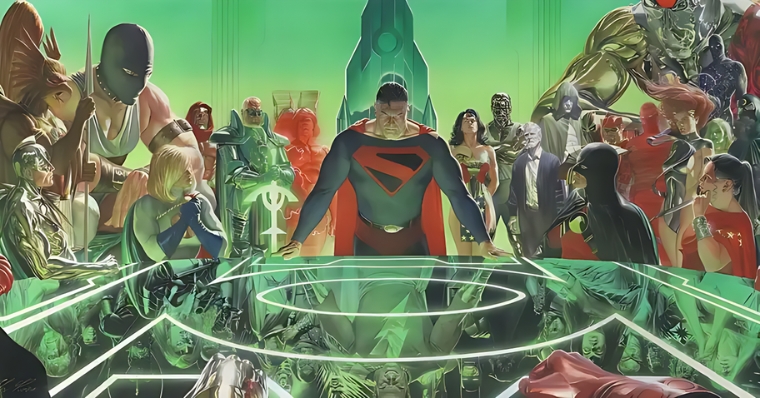
Kingdom Come
"Kingdom Come" isn't just another storyline; it's a seminal piece of work in the realm of DC Comics. Crafted by writer Mark Waid and brought to life with the breathtaking illustrations of the legendary Alex Ross, this narrative tackles a hypothetical future in the DC universe. Here, a generation of new heroes loses their moral compass, acting more like tyrants than saviors. Their actions lead to a crisis of faith in superheroism, compelling retired icons like Superman and Batman to come out of the shadows and reclaim their legacies. One of the aspects that sets "Kingdom Come" apart is its portrayal of aging superheroes. It presents a grittier, more complex look at iconic characters, delving deep into their psyches. This maturity paves the way for intricate moral debates that add layers to an already textured narrative. "Kingdom Come" didn't emerge out of nowhere. DC Comics has a long history of self-reflective mega-stories. Starting in 1986 with "Crisis on Infinite Earths," the publishing giant has often turned inward to deconstruct its own mythos. However, the spotlight year of 1996 seemed to have been overlooked in this tradition. That was until "Kingdom Come" entered the scene. Conceived by Waid and Ross, it became an instant classic. Its elegance lies in its straightforwardness—a critique of the superhero genre's trends of the time, like glorifying violent justice and anti-heroes. While Superman and other headline-grabbing figures get their fair share of the spotlight, Norman McCay, a non-superpowered aging reverend, serves as the story's conscience. Guided by DC's celestial Spectre, he offers a human lens through which to scrutinize the heroes and their decisions. What's remarkable about "Kingdom Come" is its incredibly approachable. Sure, it's peppered with Easter eggs for the comic book fans, but the story also welcomes newcomers. It's a perfect example of how to craft a compelling superhero story within a sprawling universe without leaving the uninitiated reader feeling lost. Too often, comic publishers succumb to overextending story arcs, milking every penny from readers while sacrificing narrative integrity. But "Kingdom Come" is a lesson in brevity and impact; it tells a complete story without unnecessary fluff. Given the story's depth and impact, it's no wonder there's speculation about it influencing the next wave of DC films, especially in James Gunn's hands. And why not? "Kingdom Come" presents a nuanced view of heroism, power, and morality—all fertile ground for storytelling in any medium. It would offer an opportunity to dig deep into the characters we think we know and present them in a light that could resonate with a new generation. And let's not forget those iconic moments that make "Kingdom Come" unforgettable—the poignant, the shocking, and the utterly human. Whether it's Superman's palpable disappointment or Lex Luthor's insidious manipulation, these scenes lodge themselves into your memory. But, of course, what makes a great story transcendent is its conclusion. Without giving too much away, "Kingdom Come" serves up an ending that's as thought-provoking as it is unexpected. It drives home the idea that power isn't just about brute force; it's about collaboration and understanding. It's about listening to those who don't have your abilities and working together to forge a better path. Otherwise, well, you're missing the point of what heroism truly entails. So, as we speculate about the future of the DC cinematic universe under the stewardship of talents like James Gunn, "Kingdom Come" remains a compelling candidate for adaptation. After all, what better way to reinvigorate a franchise than by drawing from a narrative that did just that for the comic book world?








